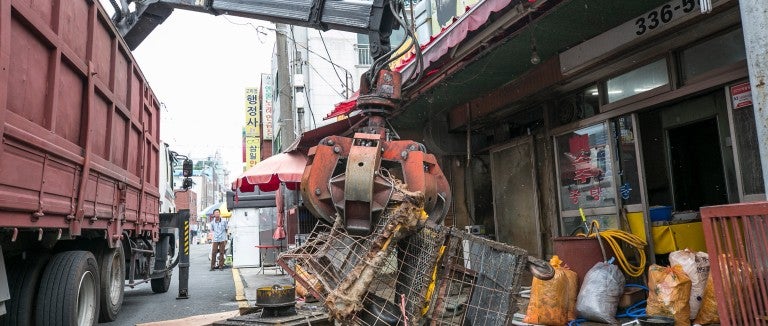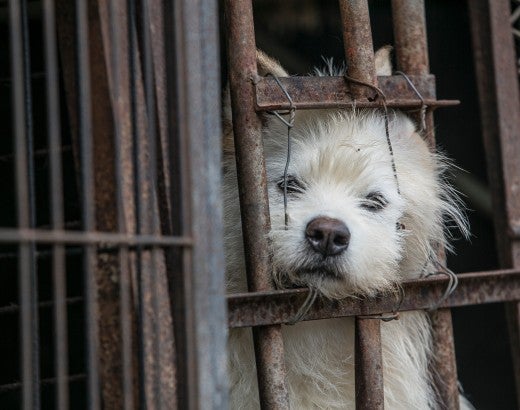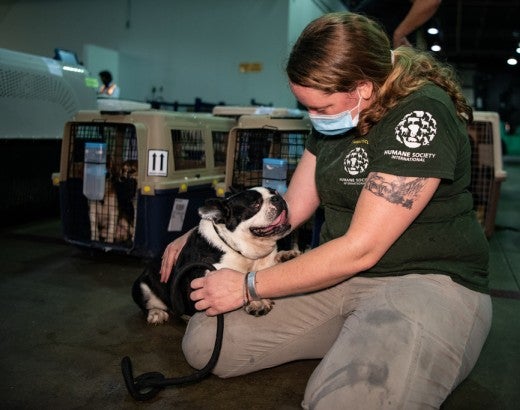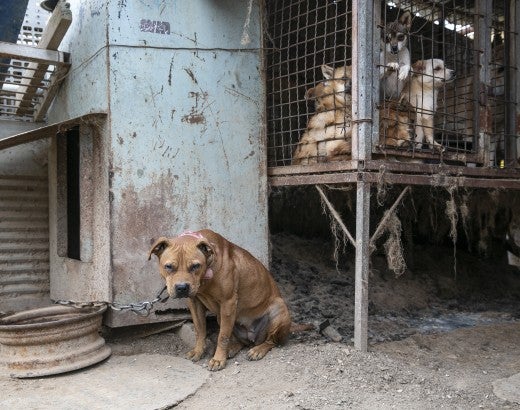We are making great progress every day in our fight to end the dog meat trade and I have two major developments to share with you today from countries that have been the focus of some of our most important work. Yesterday, South Korean authorities shut down one of their country’s largest dog meat markets where live dogs were killed to order. And in Indonesia, the animal health authority of a key province has declared its support for a ban on the trade.
The closure of the Gupo dog meat market in South Korea is an especially important victory, because for many people, this market had come to symbolize the cruelty of the dog meat trade.
In the 70s and 80s, when the market was at its peak, it housed around 60 dog meat shops. Live dogs were displayed in cages on the street for shoppers and the animals they selected would die a gruesome death by electrocution or hanging. But business began to decline after the Seoul Olympics in 1988 and there were just 17 dog meat vendors and two stores selling “dog tonic” remaining at the market at the time of the closure this week.
The vendors whose businesses were closed down were offered compensation to start alternative, humane businesses.
HSI and our local partners assisted the Busan government with the closure and were able to rescue more than 80 dogs in the custody of vendors closing their shops. The dogs, terrified and cowering in their cages, were transported out of their horrific surroundings and are now being cared for in South Korea until they are healthy and vaccinated. HSI will then fly them to our shelter partners in the United States and Canada where they will have a chance to find loving homes.

Gupo’s closure is the latest in a series of crackdowns by South Korean officials against this cruel trade, and it follows years of protests by animal protection groups. In November last year, Seongnam city demolished Taepyeong, the country’s largest dog slaughterhouse, and closed down most dog meat vendors who were operating there. The Gupo market closure is more evidence that the tide is turning against the dog meat industry in South Korea, and that demand for dog meat and tolerance for eating it is diminishing.
The dog meat industry in South Korea is still active, however, and there are an estimated two million dogs bred on dog meat farms around the country. Even so, the closure of these dog meat markets symbolizes an important shift in thinking with regards to the dog meat trade, both among average Koreans who, in growing numbers, see dogs as companions rather than food, and among lawmakers. Increasingly, law enforcement and local authorities are coming down hard on this unpopular industry and many dog farmers are also keen to exit the controversial trade which brings them nothing but societal shame and dwindling profits.
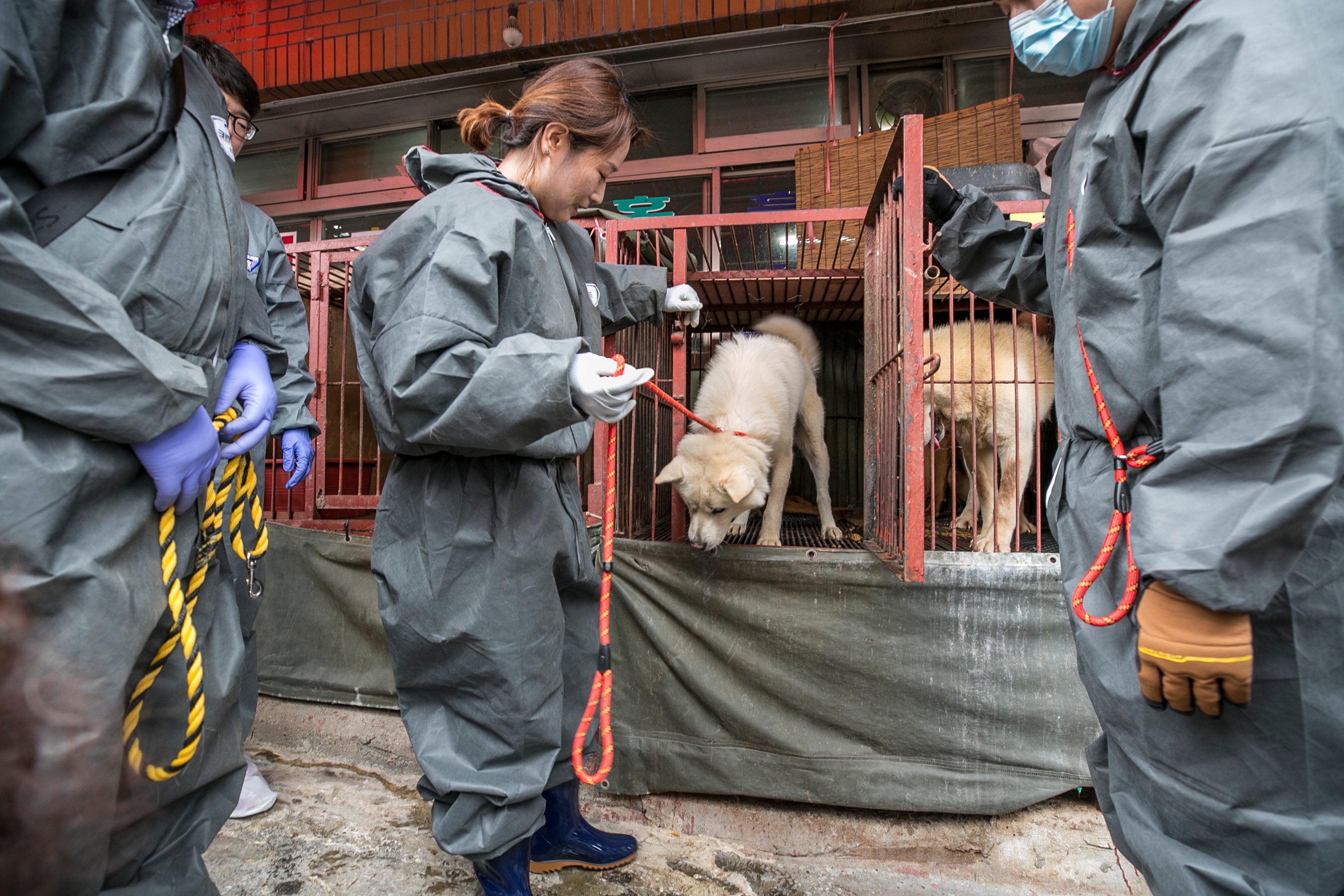
For five years now, HSI has been on the ground in South Korea, fighting for these changes. Through public awareness campaigns, dog meat farm closures exposing the suffering and truth behind the trade, and government lobbying for a ban on the industry, we have kept the global spotlight riveted on this issue while encouraging a change in hearts and minds among Koreans. To date, we have closed 14 dog meat farms, helping the farmers transition to more humane livelihoods, like growing mushrooms or water parsley or delivering water. We have transported more than 1,800 dogs, who were fated for the butcher’s block, out of South Korea and to shelter and rescue partners in countries like the United Kingdom, Canada and the United States, for a chance at a new life as a beloved companion.
In addition to Korea, our campaign to end the dog meat trade spans many other countries in Asia, including Indonesia, where we have been working as part of the DMFI-Dog Meat Free Indonesia coalition and have released investigations of the gruesome trade. This week, our work there received a further boost when the Central Java Animal Husbandry and Animal Health Service issued a statement supporting a ban on the sale of dog meat, citing the illegality and cruelty of the trade. This is an especially crucial breakthrough because Central Java is a major hub of the trade on the island of Java, which is home to more than 50 percent of Indonesian residents.
We know we have a long road ahead before no dog or cat is butchered for food, and we are committed to seeing this fight to the finish everywhere this trade exists in Asia. But the successes in Korea and Indonesia are exciting and a very promising boost for animal protection advocates like our HSI staff who bravely confront the worst sort of animal cruelty in their work on this issue. The victories this week are also evidence that we are making tangible progress in the global battle to end the dog and cat meat trade.
https://www.youtube.com/watch?v=e0WuFDYWNzs
